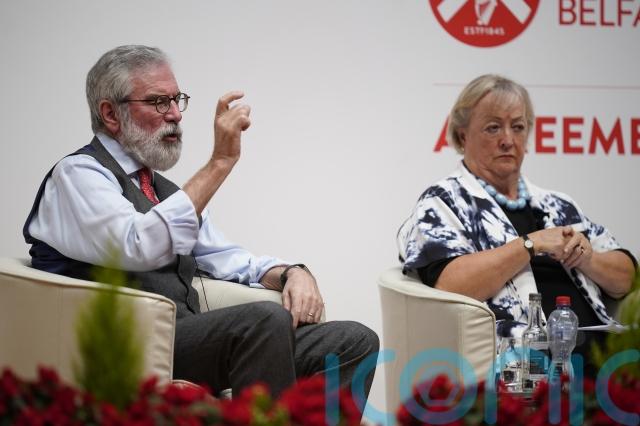
Monica McWilliams has said women’s voices are “vital” as she spoke of the importance of recognising their role in peace building in Northern Ireland.
The co-founder of the Women’s Coalition and former chief commissioner of the Northern Ireland Human Rights Commission said women bring “substance” and “broaden the agenda”.
Prof McWilliams, who was speaking at a Queen’s University conference marking the 25th anniversary of the Good Friday Agreement, said she is “delighted” to see the number of women already involved in politics in Northern Ireland and hopes to see the number rise.

“I think that their voices are vital voices,” she said.
“I also think the substance that women bring, the agenda, they broaden the agenda, is really important.”
Prof McWilliams said she went to see Agreement at the Lyric Theatre and while it was a “brilliant” drama with “superb” actors, she felt that women had “once again” been “written out”.
“And something has to be done about that,” she said.
“I pay tribute to our wonderful artists, and our poets and our playwrights, who did so much to also help make the peace here.
“But I think it’s only fair, 25 years on, that women get written back in.
“And so I keep on saying to the women in Northern Ireland, who I’m still working with, the peace building never ceases.
“But I am delighted to say that as I go up to the assembly, and sit in the gallery, and look down, once it gets re-established, that there are 36% of women now as politicians, making decisions, debating, and are the current legislators.
“And so to the next generation, I hope you join them and that number will rise and rise and rise. That’s democracy.”
Responding to Prof McWilliams, former leader of the Ulster Unionist Party Reg Empey said: “They can’t very well be involved if the institutions are shut down.”
His comment received loud applause.
“It’s like having a car and keeping it in the garage. It doesn’t make any sense,” Lord Empey said.
He also described the way Brexit was negotiated as the “worst example of state craft by the United Kingdom, certainly in my lifetime, and maybe in others”.
This comment also received rapturous applause.
Asked about what she would do differently if she could go back to 1998, Prof McWilliams said she would make the issue of establishing a process to remember victims to be “less of an aspiration and make it more of a guarantee”.
She said: “It would not be the legislative process that we are currently seeing in Westminster.
“It’s funny, isn’t it? That the one thing that has united all the parties, and that doesn’t happen often in Northern Ireland, is the opposition to this legislation.
“So let’s make it human rights-compliant. I just don’t say that because I’m the chief commissioner, or was, of the Northern Ireland human rights commission.
“I say it because we need healing. And we need what is in the title of that bill – reconciliation.
“So if I was to go back, I probably would have said let’s keep the spirit of the agreement moving fast, and let’s get proper legacy legislation in place.”
Subscribe or register today to discover more from DonegalLive.ie
Buy the e-paper of the Donegal Democrat, Donegal People's Press, Donegal Post and Inish Times here for instant access to Donegal's premier news titles.
Keep up with the latest news from Donegal with our daily newsletter featuring the most important stories of the day delivered to your inbox every evening at 5pm.